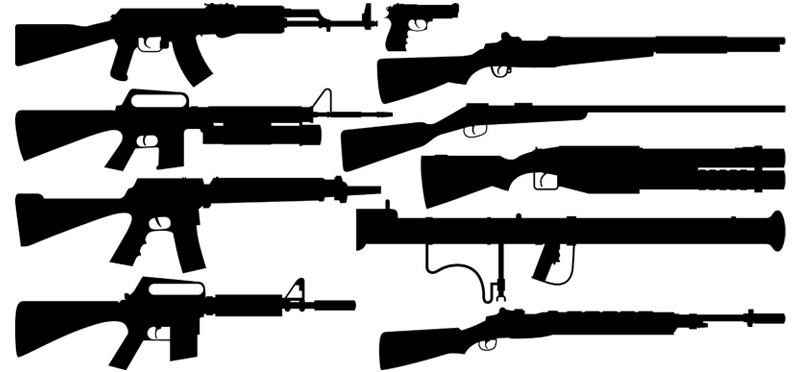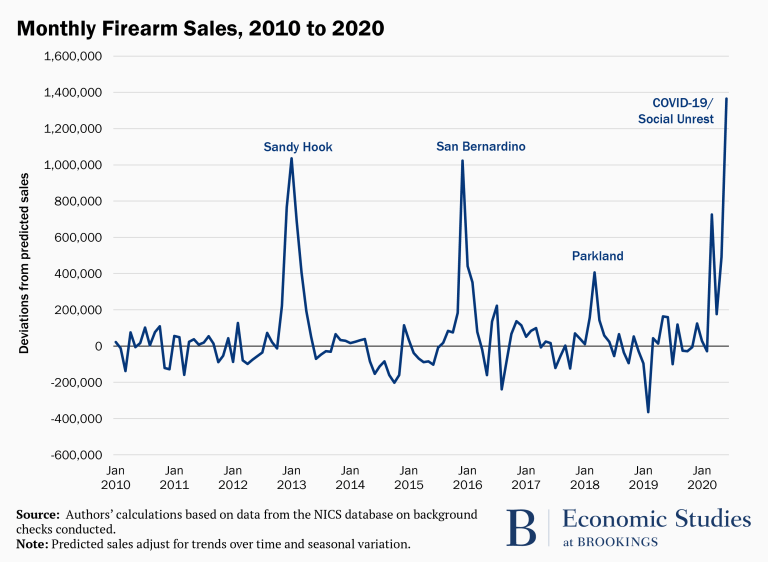Go straight to The Bottom Line
A well-regulated Militia, being necessary to the security of a free State, the right of the people to keep and bear Arms, shall not be infringed. ~ Second Amendment to the U.S. Constitution

There may be no more fraught an issue that separates conservatives from liberals than gun violence, gun rights, and gun safety in 2020. What are the facts?
There were more than 39,740 deaths involving firearms in the U.S. in 2018, according to the most recent data from the Center for Disease Control. Gun ownership is far higher in the U.S. (120.5 guns per 100 people in 2018) than in any other country. We also have a higher rate of gun violence, which includes mass shootings, homicides, suicides, and accidental shootings.
We may be the world’s best protector of individual gun ownership rights. But the data show that this has come at a tremendous cost.
Individual states have varying degrees of regulations that affect gun purchases, storage, and use. States with stricter gun regulations have fewer incidences of gun violence.
Over the last several decades there have been many attempts to enact what vast majorities of Americans believe to be common-sense gun legislation at the federal level. Those in favor of such legislation argue that Federal action is necessary to close loopholes in the current background check system that make it easy to buy arms online, at gun shows, and across cross state borders. Those who oppose argue that they are protecting our constitutional right to bear arms.
Since the pandemic began, gun purchases have risen starkly, as is seen in the chart below.

This trend has helped propel the issue of gun violence to the top of the list of voting issues. Let’s see what the record shows about each candidate’s stand on gun violence, and what we can expect from a Biden or Trump administration. Let’s focus on two measures that affect the purchase of firearms:
Who can buy guns: The background check system is intended to keep firearms out of the hands of people who have demonstrated that they could pose a danger to others and to themselves. Significant loopholes could be closed to make the system work more effectively. Universal background checks are supported by the vast majority of Americans.
What guns they can buy: The 1993 Assault Weapons Ban expired in 2004. Reenacting the ban would prevent civilians from purchasing military-style weapons (used in many mass shootings) and high capacity magazines. This was supported by 68 per cent of Americans in 2017.
What the candidates say
BIDEN:
Biden’s campaign website contains a detailed page dedicated to addressing gun violence.
Biden supports:
· a ban on the sale of assault weapons and high-capacity magazines
· a national buyback program for assault weapons
· measures to expand background checks: closing the online, gun show and other loopholes, and reinstating the prohibition of gun sales to individuals with mental health issues
TRUMP:
Trump’s 2020 campaign website does not feature a specific section on gun violence. However, the page on Law and Justice includes these points:
- Criminals charged with unlawful possession of a firearm has increased 23 percent.
- President Trump signed the STOP School Violence Act and the “Fix NICS Act.”
The Stop School Violence Act provided funds for violence-prevention efforts at schools, including armed officers; the Fix NICS Act is intended to improve information-sharing in the National Instant Criminal Background Check System.
In the 2016 campaign, Trump took the position that “assault weapons bans are a total failure.”
What the record shows
BIDEN
- 1993: As a U.S. Senator Biden voted in favor of the Assault Weapons Ban, and the Brady Handgun Violence Prevention Act, which established the background check system.
- 2012: After the mass shooting at the Sandy Hook Elementary School, President Obama appointed Biden head of a gun violence task force, in charge of developing legislation including expanding background checks by closing the gun show loophole and passing a new assault weapons ban. The effort was derailed by the NRA and Republicans in Congress.
TRUMP
- 2017: Trump signed H.J.Res. 40, which ended the Obama regulation requiring the Social Security Administration to put names of mental health benefits recipients in the background check database.
- 2018: Trump’s Department of Justice did issue a Bump Stocks ban, which bans the device that makes semiautomatic rifles shoot almost as fast as automatic weapons.
- 2018: After the mass shooting at the Marjorie Stoneman Douglas High School in Parkland, FL, Trump seemed to support background check legislation. But when he later threatened to veto legislation passed by the House – The Bipartisan Background Checks Act of 2019 (H.R. 8) and the Enhanced Background Checks Act of 2019 (H.R. 1112) to close the Charleston Loophole (extended checks from 3 to 10 business days) – neither measure was taken up by the Senate.
The Bottom Line
There is no reason to expect new gun safety initiatives in a second Trump term, particularly if the Republicans maintain Senate control. At the same time, addressing gun violence and enacting common-sense gun safety measures are a top priority for a Biden administration. His record shows a decades-long concern for this issue, both as a Senator and as Vice President. Nothing in that record shows any interest in undermining the Second Amendment of the Constitution.